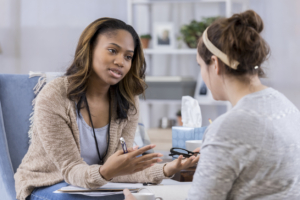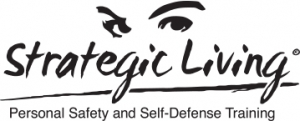Getting Support – Part 1
I’ve been teaching self-defense for over 25 years. And for most of those years I’ve been teaching that self-care is an essential part of everyone’s safety and self-defense planning. Self-care covers a wide range of actions, like exercise or meditation or listening to music or watching funny cat videos on YouTube or a glass of wine or seeking medical care or . . . pick your top three ways to calm yourself when upset or anxious. My personal favorite is playing music — drumming along to some of my all-time favorite songs, or muddling through a guitar chord progression with overdrive and reverb.
But, if I had to pick just ONE self-care practice as most critical, it has to be getting support from other people. We humans are social creatures. Any assault, or attempted assault, regardless of outcome, often feels isolating and like a loss of control over important aspects of life. Connecting with another human helps offset that, but only when that other human is supportive. We do live in a highly victim-blaming culture, and have to recognize that not every one of our acquaintances (or even family or closer friends) will be open to supporting you.
Over the years I’ve heard from several students that, when confiding in those who they assumed would be supportive, were met with statements such as “what did you expect,” or “you sure won’t make that mistake again,” or “I hope you learned something from that experience,” or “how could you let that happen to you.” As humans, we will often look to safety, or at least to mitigate and manage risks. Some people’s interest in hearing about others’ misfortunes is to “inform” themselves so they won’t make the same “mistakes.” And sometimes they will think they are helping by informing you of their conclusions. It may not mean they are a bad person, but it does mean they don’t have (or are not willing to make available) emotional bandwidth for you.
But let’s get back to getting support. How would we recognize that supportive human? Is there a covert signal or secret handshake?
By what they do. Here’s my thumbnail sketch of what a supportive human would do.
- They listen.
- They believe you.
- They remind you it wasn’t your fault.

Getting support from a trusted friend or family member is an important component in healing from assault.
I’m going to go over each of these three items. In this blog post, it’s listening. Next couple of weeks will cover believing and not blaming you. And then we’ll tie it up with steps for the future.
First, though, I strongly suggest that you give a potential listener a heads-up that you’d like to share something uncomfortable. Give them a chance to assess their readiness to offer support. Or, if necessary, set their own boundaries. Even the best supporters are not available 24/7 to everyone (self-care, remember?). An important part of getting support is that the support has to be voluntarily given!
Someone who is listening is really LISTENING, rather than trying to figure out their snappy reply. Listening is NOT letting you talk for 10, 20, or 60 seconds, then interrupting with “hey did you try THIS? You coulda done THAT, you shoulda done THAT, I woulda done . . . ” Thank that person for their time, and move on. They don’t have bandwidth for you.
Rather, listening involves taking in what that other person is offering. A really good listener will treat what you’re saying as a gift, and if they have the emotional space they will be paying attention to what you are saying and the event’s impact on you. You may hear something more like, “That sounds horrible, I’m so sorry you had that experience! I am here for you.” And now is where listening is super important. The listener could assess if you need to just talk, or if they are looking for advice, or if they have their next steps and want your help. And, dear listener, it’s OK to ask. Do keep in mind that part of the trauma of assault is the feeling that control over ones life has been torn away; one goal of the listener is to help empower those hurt by making sure their choices are really theirs.
Next week, we look at the other two items on my list, believing and reminding that assault is not your fault.
